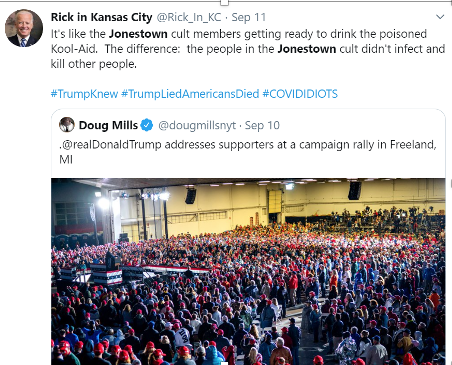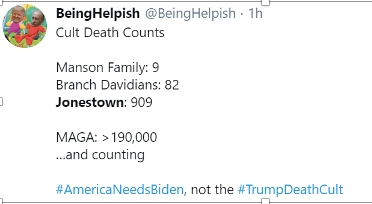(Katherine Hill is an Associate Professor of Psychology at Metropolitan State University of Denver and is a regular contributor to this website. Her complete collection of articles is here. She may be reached at hilltass@gmail.com.)
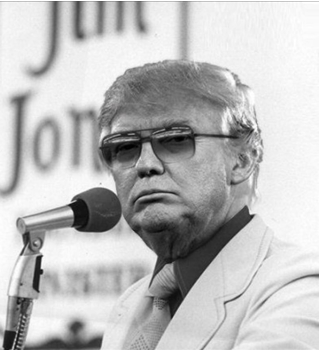 In 2016, I wrote an article for the jonestown report comparing Donald Trump to Jim Jones. At the time, a fear that some people would think I was being hyperbolic may have prevented me from sharing the article more widely. In hindsight, I wish that I had. Over the past couple of years, I occasionally receive e-mail from people who have stumbled upon the article and felt compelled to write me about it. About a third of those messages come from Trump supporters who merely attack what I wrote – and sometimes me – without attempting to refute my points. The other two-thirds are from people who agree with the article, telling me they see the same things I do. A couple of people asked that I provide an update, given that Trump’s behavior seems to have worsened during the time that he has been in office. I guess once you see the Trump/Jones parallels, it’s impossible to “unsee” them.
In 2016, I wrote an article for the jonestown report comparing Donald Trump to Jim Jones. At the time, a fear that some people would think I was being hyperbolic may have prevented me from sharing the article more widely. In hindsight, I wish that I had. Over the past couple of years, I occasionally receive e-mail from people who have stumbled upon the article and felt compelled to write me about it. About a third of those messages come from Trump supporters who merely attack what I wrote – and sometimes me – without attempting to refute my points. The other two-thirds are from people who agree with the article, telling me they see the same things I do. A couple of people asked that I provide an update, given that Trump’s behavior seems to have worsened during the time that he has been in office. I guess once you see the Trump/Jones parallels, it’s impossible to “unsee” them.
Below are my current reflections, as there does seem to be more to say on the subject.
“Help Us Get Out of Jonestown Trumpland”
On Friday, November 17, 1978, in the pavilion at Jonestown, Vernon Gosney awkwardly passed a note to a reporter. The message was a plea from Gosney and his friend Monica Bagby who got their wish to leave Jonestown the next day, though it came at a terrible price. Gosney was one of several people who was wounded at the Port Kaituma airstrip during the attack that killed Congressman Leo Ryan and four others. The gunmen then returned to Jonestown in time to participate in the death of more than 900 people. Although there had been tense moments during Ryan’s visit – including Temple member Don Sly threatening Ryan with a knife – the airstrip shootings were the point of no return for Jim Jones and his people.
By the time Ryan had arrived for his visit, Jones had been a leader in crisis for more than a year, when the publication of the New West exposé prompted Jones’ flight to Guyana, never to return to the United States. Pressure mounted on Jonestown throughout the remaining 15 months of its life. A legal battle emerged over the custody of John Victor Stoen. There were problems managing the agricultural commune, including the fact that it was not self-sustainable. Discipline issues arose. The Concerned Relatives and Temple defectors didn’t let up on telling what they knew and demanding contact with their loved ones whom they alleged were captive in Jonestown. High-ranking Temple members defected. Jones’ health suffered, especially from a psychological standpoint. The periodic “White Nights,” dripping with paranoia, offer a picture of a mentally unstable leader, and Jones may have been relying heavily on drugs during Jonestown’s final months to cope with his pressures.
But what does any of that have to do with Donald Trump? It’s simple: Trump is a leader in crisis who is experiencing mounting pressure. He came into office amid a cloud of suspicion that he was aided by – as well as compromised by – Putin. The Mueller investigation had him worried, although to the amazement of his detractors, it was not his undoing. The Ukrainian quid pro quo scandal led to his impeachment, but again, not his undoing. The COVID-19 pandemic further escalated his problems, and it is relentless. In addition to the steady rise in deaths from the virus – more than 200,000 at this writing – the economy has tanked and unemployment is at historic levels. Trump’s health, including his psychological condition, is arguably worse than when he entered office. Rumors abound that his seemingly erratic behavior – up some days and down others – is related to drug use. As the final months before the 2020 election have ticked by, Trump seems desperate as polls show him losing to Joe Biden. He faces possible legal consequences if he loses re-election. (New York prosecutors say Trump could be investigated for tax fraud.) More people are speaking about how he is unhinged and unfit to serve as President. Thus Trump, who shares narcissistic and antisocial personality traits with Jones, is experiencing his own escalation of problems that won’t go away – just as Jones did. When malignant narcissists get cornered, the risk that their behavior will become (even more) perilous escalates. But narcissists of a Jim Jones or Donald Trump level don’t go down alone: they take others with them. If they can’t escape, they burn it all down.
The (Un)Chosen One
The biggest change since my 2016 Trump/Jones article is that I am no longer alone in comparing Trump to Jones or discussing how threatening Trump is by implication. Firstly, numerous experts have stepped forward to discuss the peril that Trump represents to the republic. Steven Hassan, a mental health counselor and expert on cults, provides a detailed case in his 2019 book not-so-subtly-titled The Cult of Trump: A Leading Cult Expert Explains How the President Uses Mind Control. Notably, Hassan directly compares Trump to Jones and warns that the President could be dangerous. [An article in the British newspaper, The daily Mail, about Steven Hassan’s book, appears here.] Others have argued against the “Goldwater rule” – which states that it is unethical for psychiatrists to give a professional opinion about public figures whom they have not examined in person – in favor of a duty to warn the public. The book, The Dangerous Case of Donald Trump: 37 Psychiatrists and Mental Health Experts Assess a President, explains that recognizing dangerous behavior – based upon an abundance of evidence from Trump’s behavior on full public display – is different from offering a diagnosis of someone based on private personal interviews. These professionals make it clear that they see Trump as an existential threat to America. More recently, Mary Trump, Donald Trump’s niece who holds a Ph.D. in Clinical Psychology, wrote a book about her uncle, examining Trump’s family life and giving insight into what shaped him into the person he became. All of these sources recognize Trump’s narcissism, his unfitness for office, and his menace.
Additionally, Trump/Jones comparisons are increasingly common in our culture. Several syndicated columnists have provided their observations:
Trump apologists have drunk the Kool-Aid (April 2018)
The moral of [Jonestown] is this: Unquestioning obeisance to unaccountable power is a recipe for disaster, a lesson we may be poised to relearn. No one can say what form some new disaster might take, but that one is coming seems more likely every day. If and when it does come, nine out of 10 Republicans will be its authors.
 Trump’s death cult presidency – As a result of Trump’s willful negligence, inept leadership, and sociopathic narcissism, nearly 100,000 people nationwide are dead from COVID-19 (May 2020)
Trump’s death cult presidency – As a result of Trump’s willful negligence, inept leadership, and sociopathic narcissism, nearly 100,000 people nationwide are dead from COVID-19 (May 2020)
Some U.S. citizens have written in letters to the editor of their local newspapers:
Letter: Trump echoes of Jim Jones, David Koresh – The GOP has become a cult of he president, and he can do or say whatever he wants and not be held accountable (November 2018)
 Talk of the County: “Watch out Trump cult, he may be offering up a poison drink next, just like the Jim Jones cult” (April 2020)
Talk of the County: “Watch out Trump cult, he may be offering up a poison drink next, just like the Jim Jones cult” (April 2020)
Other comparisons are circulated on social media platforms such as Twitter and Facebook. Most of those who circulate these observations are not mental health professionals, but they nonetheless feel compelled to share parallels which they find glaringly obvious. Some comparisons are photo memes that mash up images of Trump and Jones:
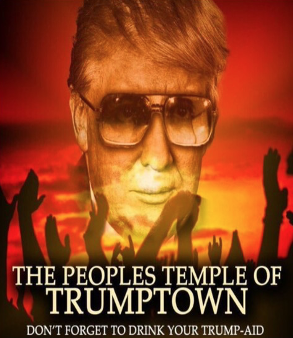 (The above image is being sold by Redbubble).
(The above image is being sold by Redbubble).
Here are some more observations from the Twitterverse:
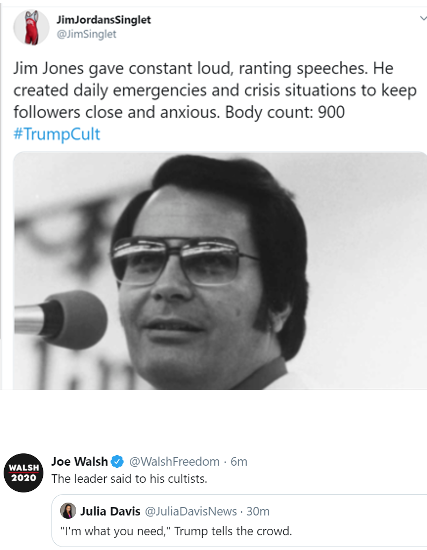
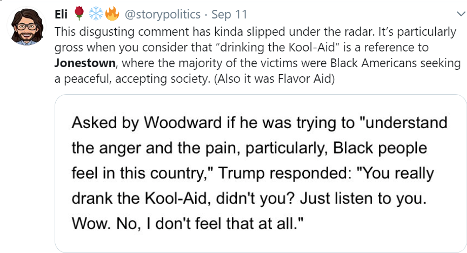 If you’re wondering whether Donald Trump understands or is even familiar with the phrase “drinking the Kool-Aid,” recent revelations remove all doubt: in a recorded phone interview with journalist Bob Woodward, Trump told him, “You, you really drank the Kool-Aid, didn’t you?” I think the truly jarring nature of that statement is captured in this tweet:
If you’re wondering whether Donald Trump understands or is even familiar with the phrase “drinking the Kool-Aid,” recent revelations remove all doubt: in a recorded phone interview with journalist Bob Woodward, Trump told him, “You, you really drank the Kool-Aid, didn’t you?” I think the truly jarring nature of that statement is captured in this tweet:
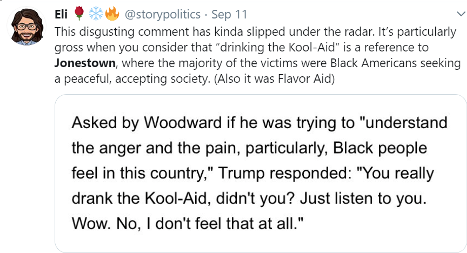 That Trump doesn’t really comprehend or accept the notion of white privilege is not surprising, but that he would admit it so candidly to Woodward is. At this juncture, it seems incredibly unlikely he’ll lose any supporters over this statement, an observation captured in this tweet:
That Trump doesn’t really comprehend or accept the notion of white privilege is not surprising, but that he would admit it so candidly to Woodward is. At this juncture, it seems incredibly unlikely he’ll lose any supporters over this statement, an observation captured in this tweet:
One cannot be a leader without followers. Most of Jones’ followers in Jonestown went along with him right up to their deaths. Although there are reports of some resistance, tape Q042 reveals that Christine Miller was the only vocal dissenter to what was unfolding before her community, and she was soon shouted down by her brethren. More than that, numerous people later gave thanks to Jones shortly before they took the poison. When the residents of Jonestown awoke on November 18, 1978, they might not have had dying in mind, but that’s what Jones required by day’s end, and most complied. They had already shown their loyalty during previous “White Nights.” Their earlier compliance paved the way for their later compliance.
More and more people view Trump’s followers as zealots who blindly follow a cult leader. “Cult 45” is a Twitter hashtag used as a derogatory term for the collective of Trump followers, otherwise known as #MAGAts or #MAGA morons. Trump’s followers are regularly accused of “drinking the Kool-Aid.” The characterization of Trump zealots generally fits the stereotypes of other cult members – so long as we’re talking about verbal labels. Words like brainwashed, gaslighting, zombies, dumb, stupid, morons, crazy, idiots, lemmings, and sheep seem predictable. The same terms were used in the context of Jonestown. Here’s a sample of what you might find on Twitter: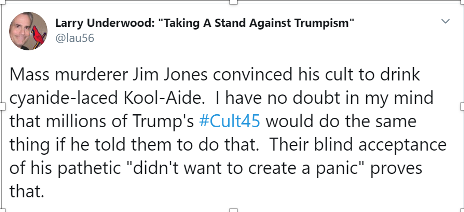

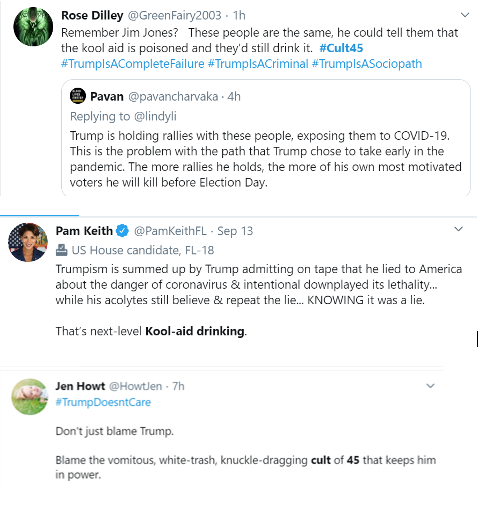 Pictorial and cartoon representations of Trump followers add a new level of insult to the characterizations, as seen in these memes:
Pictorial and cartoon representations of Trump followers add a new level of insult to the characterizations, as seen in these memes:
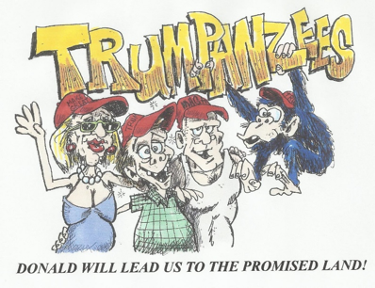
 This depiction below makes me think of Sharon Amos’ final action:
This depiction below makes me think of Sharon Amos’ final action:
 If you’re into video depicting Trump supporters as sheep, I invite you to view the modified footage of the recent “stampede” in Minden, Nevada, as the MAGA crowd rushes to get into the indoor venue.
If you’re into video depicting Trump supporters as sheep, I invite you to view the modified footage of the recent “stampede” in Minden, Nevada, as the MAGA crowd rushes to get into the indoor venue.
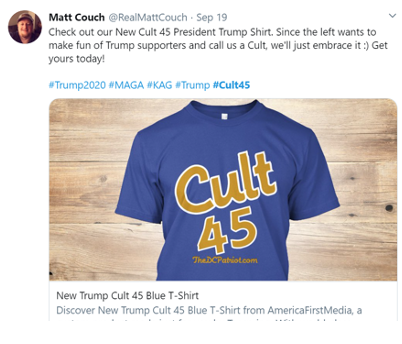 Plot twist: one proud Trump supporter embraces the Cult45 identity and encourages others to do so, too, by getting their own t-shirt:
Plot twist: one proud Trump supporter embraces the Cult45 identity and encourages others to do so, too, by getting their own t-shirt:
The loyalty of Trump supporters may rival that of Jones’ supporters who followed him to their deaths. At present, I keep asking if their loyalty is as limitless as it seems. Thousands of Trump followers willingly attend the MAGA version of a “White Night”: a Trump 2020 campaign rally. I have thought of these “superspreader” events as White Nights since Trump’s Tulsa rally in April, when about 6,000 people packed themselves into an arena that normally holds around 19,000. I say “packed,” because with less than a third of the seat capacity used, people could have distanced from one another at the event – but very few did. Predictably, masks were scarce. Is it a coincidence that there was a spike in COVID-19 cases in Tulsa shortly after the rally? Is this where Herman Cain caught coronavirus, ultimately leading to his death? There were very few rallies over the summer, but the pace has picked up briskly of late, with Trump holding numerous rallies within just the past few weeks. The Minden rally drew several thousand people. At this rate, there will be tens of thousands of Trump supporters who will have risked infection attending these events by the time the election is over. I cannot help but wonder if some of those from the Minden rally will die of COVID-19 before having the opportunity to cast their votes.
While it might seem like it would take strong loyalty to potentially expose oneself to possible infection in a high-risk situation, Trumpists often parrot the words of their leader: the coronavirus isn’t as dangerous as the liberals say, and it’s about like having the flu. Some will even repeat Trump’s words from late February in which he called it a “hoax.” All the while, Trump followers and mask-wearers debate who has been brainwashed:
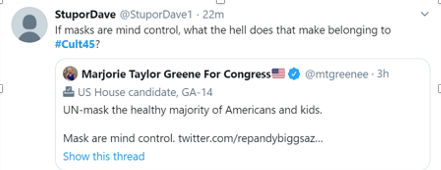 Trump eschews masks, and so do his followers. In what might be described as a “herd mentality,” his followers drink in his paranoid propaganda about all of the bad things that will happen if Joe Biden wins, while they simultaneously breathe in what might be “poisoned” air. Moreover, they applaud and cheer while doing it.
Trump eschews masks, and so do his followers. In what might be described as a “herd mentality,” his followers drink in his paranoid propaganda about all of the bad things that will happen if Joe Biden wins, while they simultaneously breathe in what might be “poisoned” air. Moreover, they applaud and cheer while doing it.
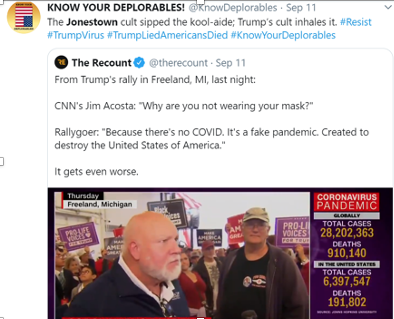
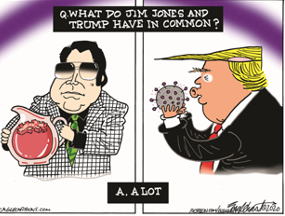 We probably should not be surprised by Trump supporters’ loyalty: their leader is under immense pressure because (as he keeps telling them) he is treated very unfairly. When Jones felt he was under attack from all sides, his followers rallied around him with support. For example, Pam Moton wrote an open letter to Congress which foretold their ultimate fate: that it would be “better even to die than to be constantly harassed from one continent to the next.”
We probably should not be surprised by Trump supporters’ loyalty: their leader is under immense pressure because (as he keeps telling them) he is treated very unfairly. When Jones felt he was under attack from all sides, his followers rallied around him with support. For example, Pam Moton wrote an open letter to Congress which foretold their ultimate fate: that it would be “better even to die than to be constantly harassed from one continent to the next.”
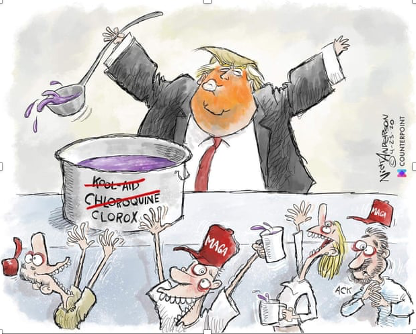 (The above cartoon was to be sold on Redbubble, but the Trump campaign managed to thwart it.)
(The above cartoon was to be sold on Redbubble, but the Trump campaign managed to thwart it.)
When Jonestown survivors returned to the States after the tragedy, some were called baby killers. There’s a Trump supporter equivalent for that:
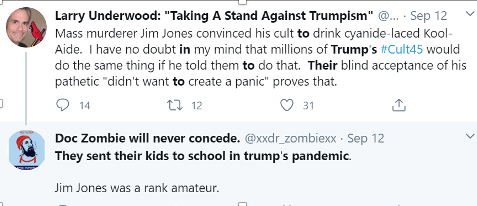 Occasionally, the Jonestown victims are seen more favorably than Trump supporters, based on the magnitude of the tragedy:
Occasionally, the Jonestown victims are seen more favorably than Trump supporters, based on the magnitude of the tragedy:
There were some people who were deeply tied to Jones who got out of Jonestown and who made their concerns public. This is true as well of some people once affiliated with Trump, although in their cases they may not have initially chosen to abandon the President. Anthony Scaramucci – notable for having the shortest tenure of any of Trump’s White House communications directors – and Michael Cohen, Trump’s former “fixer,” have joined the ranks of those speaking out against their former boss. Neither left Trump voluntarily: “the Mooch” was fired, and Michael Cohen was arrested and convicted of campaign-finance violations linked to hush money payments. These men propped up Trump and enabled him, and some people question their credibility; but I maintain that these men (especially Cohen) knew Trump only too well. If they can see the parallels, then we ought to at least listen to what they have to say:
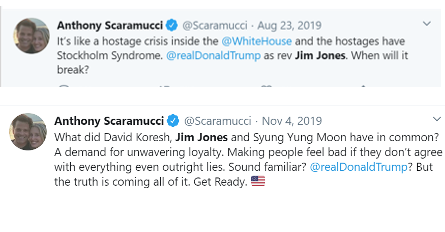 Michael Cohen also makes explicit comparisons between Trump and Jones in Disloyal: A Memoir. Of some of the despicable tasks he performed as Trump’s fixer, he writes:
Michael Cohen also makes explicit comparisons between Trump and Jones in Disloyal: A Memoir. Of some of the despicable tasks he performed as Trump’s fixer, he writes:
This behavior is part of what constituted “loyalty” to Donald Trump: whatever he wanted done, I would do, nor matter how dishonest, or dishonorable. Trump saved the crappiest jobs for me, a fact that I took pride in; I was given the dirty work because I was willing to get dirt on my hands – and blood if necessary.
If that seems bizarre to you, think of it like being under the spell of a cult leader. I don’t mean that as a cliché or an accusation: I mean it literally. How did Jim Jones get his followers in Guyana to drink the poisoned Kool-Aid (actually, it was a cheap knockoff called Flavor Aid) and commit mass suicide? The answer was that Jones took control of the minds of those drawn to him, not all at once but gradually, over time, by luring them into his mind.
“Stop drinking the Kool-Aid,” we would say to each other at the Trump Organization, all the time.
The joke wasn’t really a joke, even as we joshed around. Trump would say so many things that were illogical or just plan bullshit, as we consciously would know, but we would stay on his message, even though we knew it was nonsense. We would repeat what he said, as if it were true, and then we’d repeat the message to one another so often that we would actually begin to believe the distortions ourselves.
Kindle location 1862 – 1868
How Did We Get Here? How Do We Get Out?
“Those who cannot remember the past are condemned to repeat it.” – George Santayana
I think it would be fitting if the famous Santayana quote, once posted in the Jonestown pavilion above Jones’ throne, was displayed on Trump’s podium during his rallies. Maybe it would serve as a reminder to those who listen to the lies Trump spews: America has seen this kind of leader before – and it didn’t end well.
We’ve already seen 200,000 Americans die of the coronavirus because Trump lied about – not downplayed – the seriousness of the disease. The blood on Trump’s hands at this juncture is the equivalent of about 218 Jonestowns. If his real (non)plan is to let the disease “wash over” America to attain herd immunity, millions of people will die. If I survived it, I would cease comparing Trump to Jim Jones because Adolf Hitler would be a more apt comparator.
Those of us who aren’t members of Trump’s group are like strangers in a strange land; the experience is surreal, frustrating, and frightening. Trumpland has been built up around us – we didn’t choose to, but we are forced to live there. Trump is omnipresent, like Jones’ voice broadcast endlessly over the loudspeakers in Jonestown. We see the leader’s poor judgment, slurred speech, and erratic behavior, and we know the danger he poses. But presently, and individually, we lack the power to stop him.
In the words of a Twitter user:
 I think I see now that Gosney and Bagby wanted out of Jonestown for some of the same reasons why I want out of Trumpland. Maybe they felt psychologically tortured by the often nonsensical and/or cruel ramblings of a malignant narcissist who jeopardized their health and safety due to his unfitness to lead. Likely they felt their civil liberties had been infringed. Almost certainly they feared what an unhinged man who had seemingly absolute power over their lives would do next. I think they felt this more acutely than I do because of the microcosm that was Jonestown and the almost complete lack of contact with outsiders. But both Jones and Trump were surrounded by enablers who could serve as guard rails, yet failed in this capacity.
I think I see now that Gosney and Bagby wanted out of Jonestown for some of the same reasons why I want out of Trumpland. Maybe they felt psychologically tortured by the often nonsensical and/or cruel ramblings of a malignant narcissist who jeopardized their health and safety due to his unfitness to lead. Likely they felt their civil liberties had been infringed. Almost certainly they feared what an unhinged man who had seemingly absolute power over their lives would do next. I think they felt this more acutely than I do because of the microcosm that was Jonestown and the almost complete lack of contact with outsiders. But both Jones and Trump were surrounded by enablers who could serve as guard rails, yet failed in this capacity.
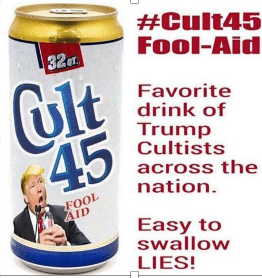 Perhaps there is hope, though. As Gosney and Bagby left Jonestown on November 18, 1978, they weren’t alone: a dozen more people joined them in their decision to leave Jonestown. I am not alone, either. Consider this article a note seeking help on the eve of destruction. The increasingly common, open comparisons of Trump to cult leaders in general – and Jim Jones in particular – are more notes asking for help to get out of Trumpland. The road out starts at the ballot box. If our path is blocked now, we may not ever make it out of Trumpland. I’m not certain what will pose itself as the point of no return – our Port Kaituma ambush, if you will – but be on guard for it. If Trump isn’t stopped, the eventual devastation that awaits could be beyond what our imaginations can fathom. Vote like your lives depend on it, because they do.
Perhaps there is hope, though. As Gosney and Bagby left Jonestown on November 18, 1978, they weren’t alone: a dozen more people joined them in their decision to leave Jonestown. I am not alone, either. Consider this article a note seeking help on the eve of destruction. The increasingly common, open comparisons of Trump to cult leaders in general – and Jim Jones in particular – are more notes asking for help to get out of Trumpland. The road out starts at the ballot box. If our path is blocked now, we may not ever make it out of Trumpland. I’m not certain what will pose itself as the point of no return – our Port Kaituma ambush, if you will – but be on guard for it. If Trump isn’t stopped, the eventual devastation that awaits could be beyond what our imaginations can fathom. Vote like your lives depend on it, because they do.
Resources: books that discuss Donald Trump’s life and psychology and question his fitness for public office:
Cohen, M. (2020). Disloyal: A Memoir: The True Story of the Former Personal Attorney to President Donald J. Trump. Skyhorse.
Hassan, Steven (2019). The Cult of Trump: A Leading Cult Expert Explains How the President Uses Mind Control. Simon & Schuster.
Lee, Bandy X. (Ed.) (2019). The Dangerous Case of Donald Trump: 37 Psychiatrists and Mental Health Experts Assess a President. Thomas Dunne Books.
Trump, Mary L. (2020). Too Much and Never Enough: How My Family Created the World’s Most Dangerous Man. Simon & Schuster.

